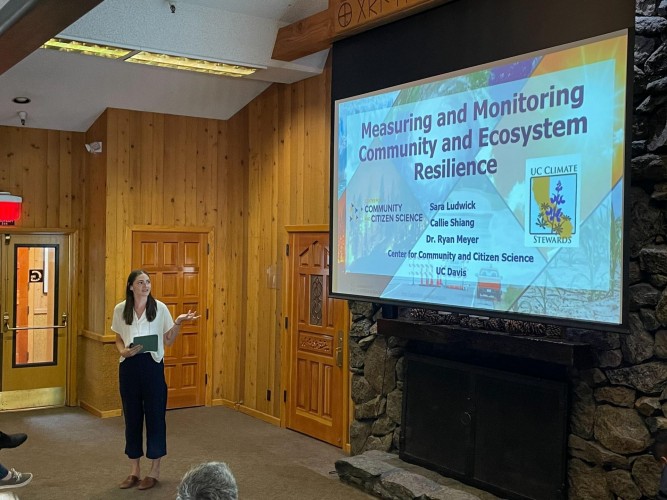Project Update: Measuring and Monitoring Community Resilience with the Climate Stewards Program
The Center collaborated with UC Agriculture and Natural Resource’s California Naturalist program to offer an evaluation of a community resilience assessment tool used within the Climate Stewards course, and to identify community and citizen science projects that could support the program’s resilience efforts.
Callie Shiang, an undergraduate intern, and Sara Ludwick, a Graduate Student Researcher, worked on analyzing the assessments and finding CCS projects relevant to resilience.
Community Resilience Assessment
Climate Stewards students and instructors completed an assessment tool, developed by Community Resilience Organizations (CROS), to measure resilience in four major areas: Basic Needs & Services, Environment & Natural Systems, Physical Infrastructure, and Community Connections & Capacity.
The Climate Stewards program intended to use these assessments to provide a baseline metric of resilience to measure changes in a community’s resilience over time, as well as insight into how participants understood resilience where they lived.
Yet applying this one assessment across communities presented challenges familiar to those who do local, community-based work. Priorities for resilience are different both across and within communities, and a tool with predefined questions and categories neglected to capture these unique conditions. We also had concerns about representation, since only those who are already actively engaged in resilience work (by nature of participating in the Climate Stewards program) completed these assessments, so the results lacked the essential perspectives of community-members outside of the course.
As a result of these limitations, the Climate Stewards decided to use the existing tool primarily as an educational exercise within the course, as it was an effective way to get participants thinking about resilience in their local areas. In the future, the Climate Stewards program hopes to develop a more streamlined and standardized assessment that can measure resilience in a way that is appropriate to apply to communities across the state.
Community and Citizen Science for Climate Resilience
We also identified existing community and citizen science projects relevant to resilience for the Climate Stewards to consider offering as part of the curriculum. The citizen science application iNaturalist is a key part of the California Naturalists course, and the Climate Stewards course wanted something similarly applicable to their course. We searched for existing CCS projects that addressed precipitation changes, extreme heat, wildfire and smoke, and climate justice–key focus areas for the Climate Stewards course in California.
While projects measuring climate impacts exist for many of these topical areas, readily-available science activities that contribute meaningful information about resilience – and would be a good fit for Climate Stewards — are hard to find. The course happens in different places, experiencing different constellations of impacts at different times, which may not align well with the timing of course delivery. Furthermore, the complexity and fundamentally social nature of resilience means that efforts to measure and monitor it may require longer-term and more intensive efforts are possible in the space of a course with a packed curriculum, taking place over a few months.
Regardless, we found a few opportunities that can offer meaningful engagement and contribution to resilience, including NOAA’s Urban Heat Island mapping campaign and the University of Nevada, Reno and the Desert Research Institute’s wildfire smoke and ash project called #Ashfall.
For a summary of these findings, check out a pdf of Sara’s presentation at the 2022 California Naturalist conference here.









